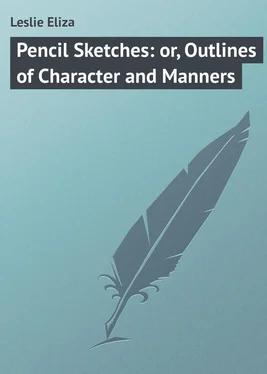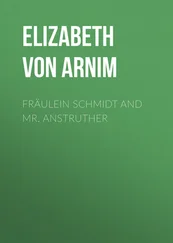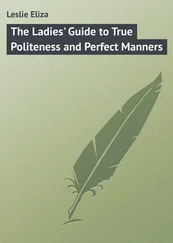Eliza Leslie - Pencil Sketches - or, Outlines of Character and Manners
Здесь есть возможность читать онлайн «Eliza Leslie - Pencil Sketches - or, Outlines of Character and Manners» — ознакомительный отрывок электронной книги совершенно бесплатно, а после прочтения отрывка купить полную версию. В некоторых случаях можно слушать аудио, скачать через торрент в формате fb2 и присутствует краткое содержание. Жанр: foreign_prose, foreign_humor, на английском языке. Описание произведения, (предисловие) а так же отзывы посетителей доступны на портале библиотеки ЛибКат.
- Название:Pencil Sketches: or, Outlines of Character and Manners
- Автор:
- Жанр:
- Год:неизвестен
- ISBN:нет данных
- Рейтинг книги:3 / 5. Голосов: 1
-
Избранное:Добавить в избранное
- Отзывы:
-
Ваша оценка:
- 60
- 1
- 2
- 3
- 4
- 5
Pencil Sketches: or, Outlines of Character and Manners: краткое содержание, описание и аннотация
Предлагаем к чтению аннотацию, описание, краткое содержание или предисловие (зависит от того, что написал сам автор книги «Pencil Sketches: or, Outlines of Character and Manners»). Если вы не нашли необходимую информацию о книге — напишите в комментариях, мы постараемся отыскать её.
Pencil Sketches: or, Outlines of Character and Manners — читать онлайн ознакомительный отрывок
Ниже представлен текст книги, разбитый по страницам. Система сохранения места последней прочитанной страницы, позволяет с удобством читать онлайн бесплатно книгу «Pencil Sketches: or, Outlines of Character and Manners», без необходимости каждый раз заново искать на чём Вы остановились. Поставьте закладку, и сможете в любой момент перейти на страницу, на которой закончили чтение.
Интервал:
Закладка:
The old lady went to Baltimore, and found herself so happy with her dear crony Mrs. Bagnell, that she concluded to take up her permanent residence with her on the same terms on which she lived at her son-in-law Billy Fairfowl's, whose large family of children had, to say the truth, latterly caused her some inconvenience by their number and their noise; particularly as one of the girls was growing up so like her grandmother, as to out-talk her. Aunt Quimby's removal from Philadelphia to Baltimore was, of course, a sensible relief to the Chestons.
Lord Huntingford (relinquishing the name and character of Mr. Smith) devoted two years to making the tour of the United States, including a visit to Canada; justly believing that he could not in less time accomplish his object of becoming well acquainted with the country and the people. On his return through the Atlantic cities, he met with Captain Cheston at Norfolk, where he had just brought in his ship from a cruise in the Pacific. Both gentlemen were glad to renew their acquaintance; and they travelled together to Philadelphia, where they found Mrs. Cheston and Myrtilla waiting to meet the captain.
Lord Huntingford became a constant visitor at the house of the Chestons. He found Myrtilla improved in beauty, and as he thought in everything else, and he felt that in all his travels through Europe and America, he had met with no woman so well calculated to insure his happiness in married life. The sister of Captain Cheston was too good a republican to marry a foreigner and a nobleman, merely on account of his rank and title: but Lord Huntingford, as a man of sense, feeling, and unblemished morality, was one of the best specimens of his class, and after an intimate acquaintance of two months, she consented to become his countess. They were married a few days before their departure for England, where Captain and Mrs. Cheston promised to make them a visit the ensuing spring.
Emily Atwood and Mr. Symmington were bridesmaid and groomsman, and were themselves united the following month. Miss Turretville made a very advantageous match, and has settled down into a rational woman and a first-rate housewife. The Miss Bentleys are all single yet; but their mother is married to an Italian singer, who is dissipating her property as fast as he can, and treating her ill all the time.
While in Philadelphia, Lord Huntingford did not forget to visit occasionally his early acquaintance, Mr. William Fairfowl (who always received him as if he was still Mr. Smith), and on leaving the city he presented an elegant little souvenir to Mrs. Fairfowl, and one to each of her daughters.
At Lord Huntingford's desire, Mrs. Quimby was invited from Baltimore to be present at his wedding (though the company was small and select), and she did honour to the occasion by wearing an entirely new gown and cap, telling the cost of them to every person in the room, but declaring she did not grudge it in the least; and assuming to herself the entire credit of the match, which she averred never would have taken place if she had not happened to come up the river, instead of going down.
The events connected with the picnic day, had certainly one singular effect on Aunt Quimby, who from that time protested that she always thought of a nobleman whenever she heard the name of Smith.
Could all our readers give in their experience of the numerous Smiths they must have known and heard of, would not many be found who, though bearing that trite appellation, were noblemen of nature's own making?
UNCLE PHILIP
"Out spake that ancient mariner." – Coleridge.
We will not be particular in designating the exact site of the flourishing village of Corinth; neither would we advise any of our readers to take the trouble of seeking it on the map. It is sufficient to tell them that they may consider it located on one of the banks of the Hudson, somewhere above the city of New York, and somewhere below that of Albany; and that, more than twenty years ago, the Clavering family occupied one of the best houses at its southern extremity.
Mrs. Clavering was the widow of a storekeeper, who had always, by courtesy, been called a merchant, according to a prevailing custom in the provincial towns of America. Her husband had left her in affluent circumstances, and to each of her five children he had bequeathed a sufficient portion to furnish, when they came of age, an outfit for the girls and a beginning for the boys. Added to this, they had considerable expectations from an uncle of their mother's, a retired sea-captain, and a confirmed old bachelor, who had long been in the practice of paying the family an annual visit on returning from his India voyages. He had become so much attached to the children, that when he quitted the sea (which was soon after the death of Mr. Clavering) he had, at the request of his niece, removed to Corinth, and taken up his residence in her family.
Though so far from his beloved element, the ocean, Captain Kentledge managed to pass his time very contentedly, taking occasional trips down the river to New York (particularly when a new ship was to be launched), and performing, every summer, an excursion to the eastward: keeping closely along the coast, and visiting in turn every maritime town and village from Newport to Portland; never omitting to diverge off to Nantucket, which was his native place, and from whence, when a boy, he had taken his first voyage in a whale ship.
Uncle Philip (for so Captain Kentledge was familiarly called by Mrs. Clavering and her children) was a square-built man, with a broad weather-beaten face, and features the reverse of classical. His head was entirely bald, with the exception of two rough side-locks, and a long thin gray tress of hair, gathered into a queue, and secured with black ribbon. Uncle Philip was very tenacious of his queue.
Like most seamen when on shore, he was singularly neat in his dress. He wore, all the year round, a huge blue coat, immense blue trowsers, and a white waistcoat of ample dimensions, the whole suit being decorated with gold buttons; for, as he observed, he had, in the course of his life, worn enough of brass buttons to be heartily tired of them: gilt ones he hated, because they were shams; and gold he could very well afford, and therefore it was his pleasure to have them. His cravat was a large black silk handkerchief, tied in front, with a spreading bow and long ends. His shirt frill was particularly conspicuous and amazingly broad, and it was fastened with a large oval-shaped brooch, containing under its glass a handsome hair-coloured device of Hope leaning on an anchor. He never wore boots, but always white stockings and well-blacked long-quartered shoes. His hat had both a wide crown and a wide brim. Every part of his dress was good in quality and large in quantity, denoting that he was above economizing in the material.
Though "every inch a sailor," it must not be supposed that Captain Kentledge was in the constant habit of interlarding his conversation with sea-terms; a practice which, if it ever actually prevailed to the extent that has been represented in fictitious delineations of "the sons of the wild and warring wave," has long since been discontinued in real life, by all nautical men who have any pretensions to the title of gentlemen. A sea-captain, whose only phraseology was that of the forecastle, and who could talk of nothing without reference to the technical terms of his profession, would now be considered as obsolete a character "as the Lieutenant Bowlings and Commodore Trunnions of the last century."
Next to the children of his niece, the object most beloved by Uncle Philip was an enormous Newfoundland dog, the companion of his last voyages, and his constant attendant on land and on water, in doors and out of doors. In the faces of Neptune and his master there was an obvious resemblance, which a physiognomist would have deduced from the similarity of their characters; and it was remarked by one of the wags of the village that the two animals walked exactly alike, and held out their paws to strangers precisely in the same manner.
Читать дальшеИнтервал:
Закладка:
Похожие книги на «Pencil Sketches: or, Outlines of Character and Manners»
Представляем Вашему вниманию похожие книги на «Pencil Sketches: or, Outlines of Character and Manners» списком для выбора. Мы отобрали схожую по названию и смыслу литературу в надежде предоставить читателям больше вариантов отыскать новые, интересные, ещё непрочитанные произведения.
Обсуждение, отзывы о книге «Pencil Sketches: or, Outlines of Character and Manners» и просто собственные мнения читателей. Оставьте ваши комментарии, напишите, что Вы думаете о произведении, его смысле или главных героях. Укажите что конкретно понравилось, а что нет, и почему Вы так считаете.












